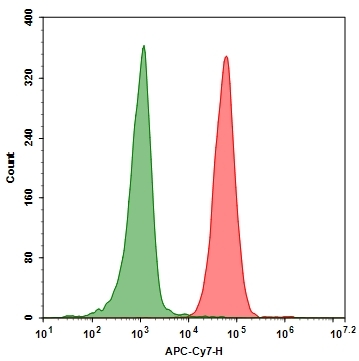APC-Cy7® tandem-labeled goat anti-rabbit IgG (H+L)
AAT Bioquest's anti-rabbit secondary antibodies are affinity-purified antibodies with well-characterized specificity for rabbit immunoglobulins and are useful in the detection, sorting or purification of its specified target. This Cy7-APC tandem-labeled secondary antibody was prepared using AAT Bioquest's proprietary labeling technology. It demonstrated much brighter signal compared to the similar APC-Cy7 tandem-labeled goat anti-rabbit IgG antibodies from other commercial sources, thus can significantly increase assay sensitivities. Secondary antibodies offer increased versatility enabling users to use many detection systems (e.g. HRP, AP, fluorescence). They can also provide greater sensitivity through signal amplification as multiple secondary antibodies can bind to a single primary antibody.


| Catalog | Size | Price | Quantity |
|---|---|---|---|
| 16873 | 100 ug | Price |
Physical properties
| Solvent | Water |
Antibody properties
| Host | Goat |
| Reactivity | Rabbit |
Spectral properties
| Extinction coefficient (cm -1 M -1) | 700000 |
| Excitation (nm) | 651 |
| Emission (nm) | 779 |
Storage, safety and handling
| H-phrase | H303, H313, H333 |
| Hazard symbol | XN |
| Intended use | Research Use Only (RUO) |
| R-phrase | R20, R21, R22 |
| Storage | Refrigerated (2-8 °C); Minimize light exposure |
| UNSPSC | 12171501 |
Contact us
| Telephone | |
| Fax | |
| sales@aatbio.com | |
| International | See distributors |
| Bulk request | Inquire |
| Custom size | Inquire |
| Technical Support | Contact us |
| Request quotation | Request |
| Purchase order | Send to sales@aatbio.com |
| Shipping | Standard overnight for United States, inquire for international |
Page updated on February 20, 2026

